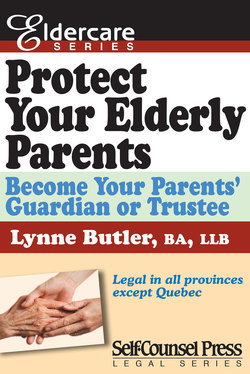Читать книгу Protect Your Elderly Parents - Lynne Butler - Страница 9
На сайте Литреса книга снята с продажи.
1.2 Trusteeship
ОглавлениеA trustee makes decisions about money, real estate, and personal property. Often there must be cooperation between the guardian and trustee if they are different people, such as the case in which a dependent adult is moved from his or her residence to live in a long-term care facility. The guardian chooses which facility is appropriate. The trustee arranges for the paying of the facility’s bills. The trustee may also, depending on the situation, arrange to sell the dependent adult’s home, clear out and distribute the contents of the house, and invest the sale proceeds on behalf of the dependent adult. In this way, both guardianship and trusteeship roles are called upon.
In law, a trustee is anyone who holds onto or looks after money or property for someone else. If you are the trustee, you have control of the money or property, but you do not own it. As the trustee, you are not holding the money or property for your own benefit or for the benefit of your family or friends. You are not entitled to use it for anyone but the dependent adult and his or her dependants. You are holding on to the property and money and managing them on behalf of the dependent adult. You are called a trustee because you have been entrusted to be the caretaker of someone else’s property.
You should note that in legal documents, when the phrase money or property is used, the word property does not just mean real estate. This can sometimes be confusing, because when the word property is used in a non-law context, it usually means a house or land. When talking about trusteeship, property can mean both real estate (e.g., land, house, revenue property, summer cottage, or mineral lease) and personal property (e.g., money, vehicle, mobile home, jewellery, furniture, clothing, tools, machinery, livestock, inheritance, investments, mutual funds, bonds, collections, artwork, corporate shares, intellectual property, and almost anything else that is not real estate). Throughout this book, the word property will mean both real and personal property.
It is essential to note that being appointed as a trustee does not give you permission to do whatever you want with the dependent adult’s property. There is a widespread impression among Canadians that a trustee, once appointed by the court, can do whatever he or she wants with the money. Nothing could be further from the truth. As a trustee you must carefully read the court order that appoints you so that you know the limits of your authority. In addition, there are laws in place that put restrictions on what all trustees can do, even though those laws may not be mentioned on the specific court order. If you intentionally or carelessly cause a financial loss to a dependent adult, you can be held personally liable for that loss. Chapter 8 will tell you more about the restrictions placed on a trustee by law.
A trustee is a fiduciary. This word describes a legal relationship in which the trustee must always, without fail, act in the best interests of the dependent adult, even if doing so means he or she acts against his or her own interests. This is not always easy to understand or to do. By agreeing to act as trustee, the trustee is willingly taking on a role in which he or she always acts in a way that is intended to benefit the dependent adult.
Across Canada, the role of a court-appointed trustee is called by one of three names, those being trustee, committee, or guardian. Table 3 lists the names for each province and territory.
